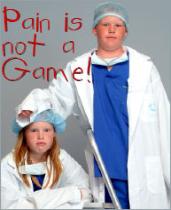Pediatric Pain Management
Abstract 2005 MHE Conference
Ashish Sinha
Department of Anesthesiology & Critical School of Medicine
University of Pennsylvania, Philadelphia PA 19104-4283
Pain in the pediatric patients is frequently under treated due to a variety of factors. From under recognition of the pain itself to
myths that children do not feel as much pain as adults, because of immature peripheral and central nervous systems. Part of
the problem is the mistaken belief that pain is less harmful than the side effects of analgesic therapy. Lack of awareness of
treatment options and ignorance of analgesic pharmacology in children compound this problem.
Pain assessment in children has been mandated by JCAHO and frequently referred to as the 5th vital sign. The need for
accurate pain assessment is essential for accurate pain management.\
Sometimes this is an approximation because of limited verbal communication in the younger children population. Multiple
reasons contribute to the denial of pain by children. Useful tools for pediatric pain assessment, depending on the age of the
child, include CRIES, FLACC, Wong Baker faces scale and VAS (Visual Analog Scale) scores.
Treatment of chronic pain is handled differently than that of acute pain in children. Pain treatment in the setting of chronic pain
in children is multimodal as in adults and has components of depression that should be addressed appropriately. The concept
of the WHO pain ladder being applied to children is consistent with appropriate and responsible pain management.
Pain that arises in the musculoskeletal system has issues with reluctant limb usage with its attendant problems, of dystrophy
and atrophy. An expert in physical therapy should be involved in the handling of these issues.
Abstract 2005 MHE Conference
Ashish Sinha
Department of Anesthesiology & Critical School of Medicine
University of Pennsylvania, Philadelphia PA 19104-4283
Pain in the pediatric patients is frequently under treated due to a variety of factors. From under recognition of the pain itself to
myths that children do not feel as much pain as adults, because of immature peripheral and central nervous systems. Part of
the problem is the mistaken belief that pain is less harmful than the side effects of analgesic therapy. Lack of awareness of
treatment options and ignorance of analgesic pharmacology in children compound this problem.
Pain assessment in children has been mandated by JCAHO and frequently referred to as the 5th vital sign. The need for
accurate pain assessment is essential for accurate pain management.\
Sometimes this is an approximation because of limited verbal communication in the younger children population. Multiple
reasons contribute to the denial of pain by children. Useful tools for pediatric pain assessment, depending on the age of the
child, include CRIES, FLACC, Wong Baker faces scale and VAS (Visual Analog Scale) scores.
Treatment of chronic pain is handled differently than that of acute pain in children. Pain treatment in the setting of chronic pain
in children is multimodal as in adults and has components of depression that should be addressed appropriately. The concept
of the WHO pain ladder being applied to children is consistent with appropriate and responsible pain management.
Pain that arises in the musculoskeletal system has issues with reluctant limb usage with its attendant problems, of dystrophy
and atrophy. An expert in physical therapy should be involved in the handling of these issues.

| Dr. Ashish Sinha |
| |||||||||||||||||||||||||||||||||||||||||||||||||||||||||||||||||||||||||||||||||||||||||||||||||||||||||||||||||||||||||||||||||||||||||||||||||||||||||||||||||||||||||||||||||||||||||||||||||||||||||||||||||||
| ||||||||||
The MHE Research Foundation, we comply with the HONcode standard for health trust worthy information: By the Health On the Net Foundation.
Click here to verify.# HON Conduct 282463 and is the patient support link on the US Government Genetics Home Reference (http://ghr.nlm.nih.gov)
website, also linked for Patient Information on The Diseases Database a cross-referenced index of human disease, as well as the
Intute: health & life sciences a free online service providing access to the very best Web resources for education and research located in the UK
Click here to verify.# HON Conduct 282463 and is the patient support link on the US Government Genetics Home Reference (http://ghr.nlm.nih.gov)
website, also linked for Patient Information on The Diseases Database a cross-referenced index of human disease, as well as the
Intute: health & life sciences a free online service providing access to the very best Web resources for education and research located in the UK
The MHE Research Foundation is proud to be working with the EuroBoNeT consortium, a European Commission granted Network of Excellence for
studying the pathology and genetics of bone tumors.
studying the pathology and genetics of bone tumors.
| This website is regularly reviewed by members of the Scientific and Medical Advisory Board of the MHE Research Foundation. All online submission forms use (SSL AES 256 bit encryption (High); RSA 1024 bit exchange) Protocol with Privacy protection. Our goal is to make this website as safe and user friendly as possible. |


| The MHE Research Foundation is a participating member organization of the United States Bone and Joint Decade, (USBJD) & the USBJD Rare Bone Disease Patient Network |
| Written consent must be obtained to attach web pages or the files attached to this website, please email the webmaster. Email the webmaster: webmaster@mheresearchfoundation.org Materials on this website are protected by copyright Copyright © 2009 The MHE Research Foundation Disclaimer: While many find the information useful, it is in no way a substitute for professional medical care. The information provided here is for educational and informational purposes only. This website does not engage in the practice of medicine. In all cases we recommend that you consult your own physician regarding any course of treatment or medicine. This web page was updated last on 12/16/09, 4:0O pm Eastern time |
The MHE Research Foundation is proud to be an affiliate of the Society For Glycobiology





